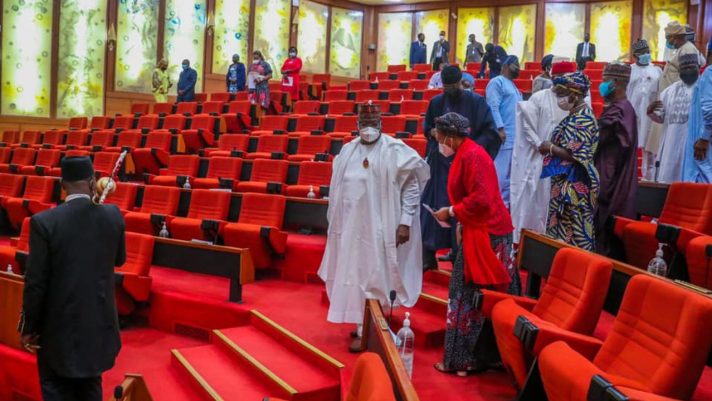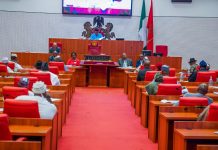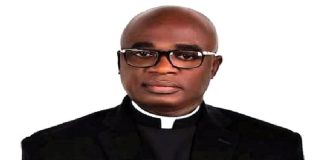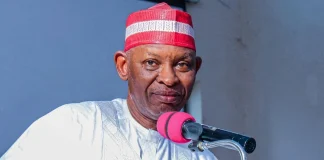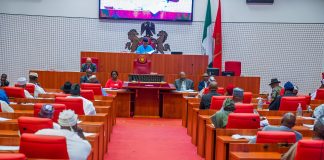🌿 Ruzu Non-Alcoholic Herbal Bitters
Ruzu Non-Alcoholic Herbal Bitters is a natural health supplement specially formulated to:
- ✅ Promote general wellness
- ✅ Detoxify the body
- ✅ Support the treatment of various ailments
Made from a powerful blend of 100% organic and medicinal herbs, Ruzu is completely alcohol-free, making it ideal for:
- 👪 All age groups
- 🌱 Health-conscious individuals
- 🌿 Anyone seeking non-alcoholic herbal remedies
Whether you're looking to boost your vitality, cleanse your system, or support healing the natural way, Ruzu Bitters offers a trusted herbal solution.
Talks as lawmakers halt Buhari’s plan to restructure N22.7tr CBN overdraft, okay N21.827tr 2023 budget
..Senate approves N819.5b 2022 supplementary bill
By Admin
The Senate, yesterday, witnessed a rowdy session, following President Muhammadu Buhari’s bid to have the National Assembly legitimise and ‘restructure’ N22.7 trillion extended to the Federal Government through Ways and Means (W&M) financing by the Central Bank of Nigeria (CBN).
The ensuing uproar led to abrupt halt of consideration of the matter. Thereafter, Senate went into a closed-door session and asked journalists to leave the chamber’s gallery.
After an hour of blunt exchanges, the leadership of the Senate grudgingly agreed that the President’s request be stepped down, pending the provision of detailed explanation on the matter.
Some lawmakers had raised objections as the leadership reached for the report of its finance committee, which recommended that the President’s request be granted.
Senator George Thompson Sekibo (APC, Rivers State) raised a point of order, to explain why the ‘ways and means’ advances were illegal and unconstitutional.
He informed the lawmakers that the action of the President was in breach of the CBN Act, the Senate standing rules, and was an assault against the privileges of the Senate and National Assembly.
Senate President Ahmad Lawan tried repeatedly to get the chamber to accede to the request. It hit the rock, however, following the depth of information and argument adduced by Sekibo.
Sekibo argued: “The Constitution states that no money shall be withdrawn from the consolidated revenue fund of the federation, except to meet expenditure that is charged upon the fund or where the issue of those monies have been authorised by an appropriation act, supplementary act or an act passed in pursuance of Section 81 of the Constitution.
“No money shall be withdrawn from any account other than the consolidated revenue fund of the federation, unless the issue of those monies have been authorised by an act of the National Assembly.
“Section 80 (4) states that no money shall be withdrawn from the consolidated revenue fund or any other fund of the federation, except by approval of the National Assembly, except in the manner prescribed by the National Assembly.”
Buhari had, last week, written a letter to the Senate, seeking approval for restructuring of N22.7 trillion W&M advances given to the Federal Government by the CBN.
MEANWHILE, with an oil benchmark of $75 and exchange rate of N435.57 to the U.S. dollar, the National Assembly, yesterday, passed N21,827,188,747,391 (N21.827 trillion) as national budget for the 2023 fiscal year.
Daily oil production benchmark of the budget is 1.69mbpd, while the Gross Domestic Product (GDP) rate is pegged at 3.75 per cent. The inflation rate is 17.16 per cent.
The budget, as passed, is in deficit of N10.782 trillion, to be funded by debt financing of N8.804 trillion, assets sales of N206.182 billion and drawbacks from loans by multilateral/bilateral institutions amounting to N1.771 trillion.
The budget was passed with the expectation of getting aggregate revenue of N9.725 trillion, which includes revenue from Federal Government’s share of gross federation revenues of N7.441; deductions worth N3.048 trillion; Federal Government’s share of net federation revenue of N4.392 trillion and independent revenues of N2.217 trillion.
Both chambers of the Assembly, at a special session, injected an increase of N1.32 trillion, from the N20.51 trillion budget proposal of President Buhari.
In the budget, N967.48 billion is for statutory transfers; N6.55 trillion is for debt service; N8.32 trillion is for recurrent (non-debt) expenditure, while N5.97 trillion is for contribution to development fund for capital expenditure for the year ending December 31, 2023.
Institutions to benefit from statutory transfers include the National Judicial Council, which takes N165 billion; Niger-Delta Development Commission, N119.93 billion, Universal Basic Education, N103.28 billion; Independent National Electoral Commission (INEC), N173.63 billion; National Human Rights Commission, N4.5 billion; North East Development Commission, N59.03 billion; Basic Health Care Fund, N51.64 billion and National Agency for Science and Engineering Infrastructure (NASENI), N51.64 billion.
Read Also:Omobolanle Raheem: NBA demands N5billion compensation for slain lawyer’s family
Also under statutory transfers, National Assembly Severance/Inauguration of outgoing and incoming 9th and 10th Assembly (legislators and legislative aides) gets N30.17 billion; National Assembly Office, N30.49 billion; Senate, N33.26 billion; House of Representatives, N51.99 billion; National Assembly Service Commission, N10.55 billion; National Institute for Legislative and Democratic Studies (NILDS), N7.41billion and Service Wide Vote N671.3 million.
Further breakdown shows that the Office of Retired Clerks and Permanent Secretaries has N1.05 billion; National Assembly Library Building, N4.25 billion; Constitution Review, N850 million; Completion of NILDS headquarters, N2.5 billion; Construction of National Assembly Service Commission Building, N10 billion and Public Complaints Commission, N10.69 billion.
For debt service, domestic debts (including Ways and Means) get N4.49 trillion; foreign debts, N1.81 trillion and sinking fund to retire maturing loans, N247.72 billion.
Under recurrent expenditure (non-debt), the presidency gets N76.40 billion; Defence, N1.09 trillion; Ministry of Foreign Affairs, N93.68 billion, Federal Ministry of Information and Culture, N59.82 billion; Interior N278.69 billion; Police Affairs N777.40 billion; Communications and Digital Economy, N32.13 billion; National Security Adviser, N172.60 billion and Secretary to the Government of the Federation,
N70.08 billion.
Also on the recurrent expenditure votes, Federal Ministry of Special Duties and Inter-Governmental Affairs gets N4.79 billion; Agriculture and Rural Development, N85.41 billion; Finance, Budget and National Planning, N29.99 billion; Industry, Trade and Investment, N16.82 billion; Labour and Employment, N15.52 billion; Science, Technology and Innovation, N52.33 billion; Transport, N18.01 billion; Aviation, N9.43 billion; Petroleum Resources, N33.15 billion and Works and Housing, N34.98 billion.
Beneficiaries from the capital expenditure vote include the Presidency, which has N20.11 billion; Defence, N285 billion; Foreign Affairs,
N5.85 billion; Information and Culture N11.87 billion; Interior, N45.62 billion; Police, N60.64 billion; National Security Adviser, N70.33 billion; Agriculture and Rural Development, N248.35 billion and Finance, Budget and National Planning, N166.74 billion.
Further breakdown of the capital expenditure vote indicated Science, Technology and Innovation was allocated N132.57 billion; Transport, N74.26 billion; Aviation, N49.41 billion; Power, N56.14 billion; Works and Housing, N398.27 billion; Federal Capital Territory Administration, N15.47 billion; Education, N153.73 billion; Health, N134.90 billion and Humanitarian Affairs, Disaster Management and Social Development N32.05 billion.
ALSO, Senate, yesterday, passed the N819,536,937,813 2022 supplementary bill, which approval Buhari requested, last week, barely 10 days to the end of the year.
The President had explained that the move was to fix infrastructure destroyed by flood incidents across the country recently.
The supplementary appropriation, Buhari explained, is meant for the capital expenditure component of the 2022 budget, with increase in deficit to N8.17 trillion.
The President added that he would embark on additional domestic borrowing to finance the proposed N819.5 billion supplementary budget
The amount was broken down for Ministries, Departments and Agencies (MDAs) involved in the Supplementary Appropriation Bill requests, with Federal Ministry of Agriculture and Rural Development having N69,247,175,770; Federal Ministry of Works and Housing, N704,789,762,043; Federal Capital Territory, N30,000,000,000 and Federal Ministry of Water Resources N15,500,000,000.
Consideration and approval of the budget followed presentation of the report of the Senate Joint Committee on the 2022 Supplementary Appropriation Bill during plenary, yesterday.
The Bill is titled, “A Bill for an Act to authorise the issue from the Consolidated Revenue Fund (CFR) of the total sum of N819, 536,937,813 for the year ending March 31, 2023’.
Presenting the report, Senator Jibrin Barau (APC, Kano) recalled that the 2022 Supplementary Appropriation Bill of N819, 536,937,813, all of which was capital expenditure, was read the first time on Wednesday, December 21.
“The Senate subsequently read the bill the second time and referred it to the Appropriation Committee, in conjunction with Committees on Agriculture and Rural Development; Works and Housing; and Water Resources for further legislative action.”
He said the bill sought to, among other things, make available additional funds to cushion effects of the 2022 flood on road infrastructure, agriculture, water infrastructure, and finishing of some ongoing projects that had achieved about 85 per cent completion.
Barau said the supplementary bill would be financed through additional domestic borrowings, which would raise the 2022 budget to N8.17 trillion only, and deficit/GDP to 4.43 per cent.
He further said the committee observed that effects of the 2022 flood across the country and its attendant consequences on roads, bridges, farmlands and the water sector necessitated the supplementary bill request.
Contributing, Smart Adeyemi (APC, Kogi) said the budget would be of benefit to all the nooks and crannies of the country. “The projects will help in guaranteeing security and ensuring socio-economic development of rural areas,” he said.
However, Mohammed Ndume (APC, Borno) said: “My worry is that this is the reality of what we are doing today. It is today that this Senate has considered extending the budget by 90 days.
“This budget, even if approved, how realistic is it going to be? By the time we process this…and the due process required in budget implementation for contract execution cannot be circumvented. If that is the case, assuming we pass it today, we have 90 days to implement.
“If it is agreed that some of these monies have to be spent within 90 days, it is not possible. Let us not deceive ourselves. We should amend the 2023 budget to take care of this projects, so that they will have 12 months of implementation.”
The budget was, thereafter, approved and passed, after going through the Committee of Supply.

